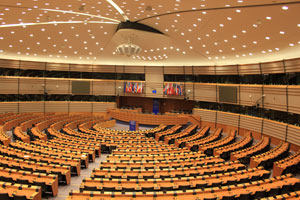A suggestion that ‘harsh austerity measures’ could lie at the bottom of some negative health outcomes associated with pollution has been sidestepped by the EU Commission.
Professor Kostas Chrysogonos, a Greek member of the European parliament recently asked three questions of the Commission under the heading of Child deaths due to pollution and an insanitary environment.
In a written preamble to his questions, Chrysogonos said that, according to the World Health Organization, a quarter of the deaths of children under the age of five worldwide were due to pollution and passive smoking. ‘In particular, the WHO reports that insanitary environments lead to fatal cases of diarrhoea, malaria and pneumonia, endangering the lives of 1.7 million children each year, since their developing organs and immune systems are unable to cope with the dangers,’ he said. ‘At the same time, the data show that the dangerous exposure of children starts with pregnancy, especially in areas where families use alternative sources of energy and heating, such as coal or unprocessed organic waste.’
Chrysogonos said that, in view of these facts, would the Commission say:
- ‘What figures does it have about the deaths of children in Europe from the above factors, especially in regions of southern Europe where thousands of families are unable to cope with the harsh austerity measures and resort to the incineration of waste and timber of doubtful quality to warm up during the winter months?
- ‘What measures does it plan to take to reduce the risks faced by children?
- ‘Does it consider that the restrictions imposed on smoking in public places have had sufficient results?’
The Commission, in its written reply to question one, said it estimated EU-wide ambient particulate matter levels in 2010 caused more than 1,800 cases of infant (up to one year) mortality. In addition, annual estimates pointed to more than six million cases of bronchitis in children aged 6 to 12 years.
In answer to question two, the Commission said that EU policy measures pursued safeguarding the public and sensitive groups, including children, from significant negative health impacts due to ambient air pollution. ‘This is achieved by enforcing the EU ambient air quality standards as well as pursuing emission reductions at source, both for individual source categories and overall national emission reductions,’ it said. ‘The Commission will also incentivise and promote better implementation of current policy measures through regular Clean Air Fora and Clean Air Dialogues with member states as well as through projects under the LIFE program, such as the Clean Heat project that aims at reducing the particulate matter emissions from domestic heating.’
And in answer to question three the Commission said the Council recommendation on smoke-free environments called on member states to develop measures to reduce children’s and adolescents’ exposure to second-hand tobacco smoke. ‘A report from 2013 indicates that all member states have now introduced smoke-free legislation,’ it said. ‘Recent surveys confirm that exposure to smoke in public places continues to decline. This illustrates that the recommendation has had a positive impact, although more has still to be done, particularly as the enforcement differs considerably across member states. Moreover, other tobacco control measures taken by the EU and its member states, including product regulation, advertising restrictions, tax measures and anti-smoking campaigns, aim at further reducing tobacco consumption.’











